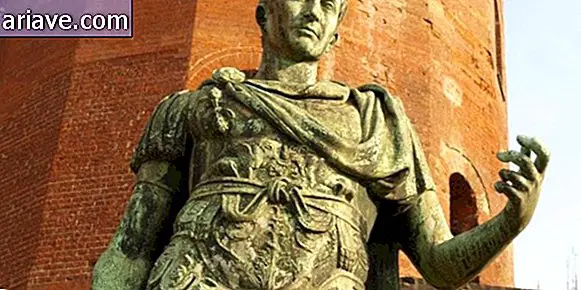5 Mythological Ways to Become Immortal
It is not from today that we try to circumvent the mortality of our bodies and live forever. In literature, works of fiction or mythology, there are several records of man's desire to prolong life.
Thought about immortality generally has two variations: that in which eternity is seen as an exacerbation of the taste for life, and another in which immortality is as a curse - of gods, darkness, or vampiric creatures - that trap humans in a time that never goes by.
Throughout human history, the struggle to overcome mortality has always led to heroic narratives, grand deeds, and epic adventures. These days we can see this desire represented in medical and scientific research that attempts to circumvent nature's time.
In addition to medical advances, which increasingly increase time and quality of life, we can also note research in the area of technology that tries to translate life essences into robotic and cybernetic projects, overcoming the limitation imposed by the body.
Despite all these speculations and ideals about seeking immortality, the reality we have is invariably different - and there is no magic or pill that can change that. As mere mortals, all we have to do is give 10 ways described in mythologies to deceive death and live forever.
1. The Legend of Sisyphus
In Greek mythology it is common to find narratives of mortals who defied the gods of Olympus and were punished by them sometimes for all eternity.
One of these stories follows the legend of Sisyphus, a mortal who was very thirsty for living an almost arrogant cleverness of deceiving the gods. His actions provoked the wrath of Zeus, and Sisyphus was sentenced to death.
However, when Thanato, the god of Death, came to meet him, Sisyphus managed to imprison him with a necklace, preventing him and other people from dying. Hades, the god of the dead, and Ares, the god of war, who badly needed the services of Thanato were irritated by Sisyphus's jest.
Thanatus was released, and Sisyphus condemned. Even after being taken to the underworld, Sisyphus was able to deceive the gods again by asking for a day to revenge the woman who did not bury her body. It was all really another plan for Sisyphus to escape and run away with his wife in life.
After dying of old age, Sisyphus was considered a rebel by Zeus and received a punishment for all eternity. He was forced to roll a large marble stone to the top of a mountain every day, and at night it would descend again and return to the same starting point.

This is why we use the expression “sisyphean work” to refer to tasks that require useless efforts and get nowhere.
2. The Holy Grail
One of the most controversial and mystery-ridden pieces of Christian mythology, the Holy Grail is considered by many to be the cup that Jesus used at the Last Supper, and has become one of the sought-after relics worldwide.
It is also believed that the Holy Grail was used by Joseph of Arimathea to collect the blood of Christ while he was on the cross. There is yet another interpretation that designates the Holy Grail as Royal Blood, even if without historical foundation, to suggest the descent of Jesus with Mary Magdalene.
It is, however, in Arthurian legend that the Holy Grail assumes a representation of immortality through Galahad. The Knights of the Round Table had the mission to find the Holy Grail, and Galahad, for his purity and mercy, is considered the only one to actually reach the mythological cup.

Sir Galahad is taken to heaven upon finding the Holy Grail, and legend has it that he achieved immortality by his deed.
3. The Ningyo Mermaid
In Japanese mythology, there is a mermaid-like creature called “ningyo”. A mix of carp and monkey, this animal is associated with bad omens and bad luck if caught from the sea.
Like the mermaid stories we know, your tale is tragic and romantic. Despite its rather grotesque appearance, ningyo could assume a human form if it cried with emotion.

In Japanese legend, ningyo is also known for its delicious and appetizing meat, and anyone who ate it could have the desired immortality.
One of the stories in this myth tells of a girl who unknowingly ate the flesh of a ningyo and was cursed with immortality. After years of sadness over the loss of so many husbands and children, she devoted herself to Buddhism and, for her holiness, was granted the right to die at 800 years of age.
4. The Fountain of Youth
In diverse cultures and mythologies, there is always a report of miraculous waters empowered to rejuvenate or grant immortality to those who have the chance to drink or bathe in these seas and rivers.
One of the best known tales in this respect is the Spanish explorer Ponce de León, who supposedly sought such a source of youth in his travels throughout America during the Renaissance and the Great Navigations.

Ponce de León's story has helped to spread the contemporary myth of the fountain of youth, which would make older elders again. There are no official documents on this explorer's expedition, much less evidence that he found anything resembling a natural rejuvenator made of crystal clear water.
5. Mystical and miraculous fruits
Similar to the forbidden fruit of biblical origin, other fruits are associated with condemnation or purification depending on the interpretation of their legends.
In Greek mythology, ambrosia was considered the delicacy of the gods and could grant immortality to humans who experienced it. But the drink should be consumed with the consent of the gods, otherwise it could lead to severe punishment for those who drink it.

In Norse mythology, it is the golden apples that guarantee eternal life and youth to the gods. In one of his narratives, Loki is persuaded to steal the golden atoms, causing the gods to age and weaken. Upon being discovered, Loki is forced to retrieve the fruits and restore the powers of his superiors.
Already in the Chinese novel Journey to the West, the mythological being Sun Wukong, the Monkey King, steals a peach plantation from the immortality of the Western Queen Mother, Xi Wangmu, and ends up consuming one of these fruits that gives him a thousand years of life. In this legend, the peach tree of immortality bears fruit only every 3, 000 years, and the Queen offers her harvest to the gods to keep them always alive.
* Posted on 9/19/2013











